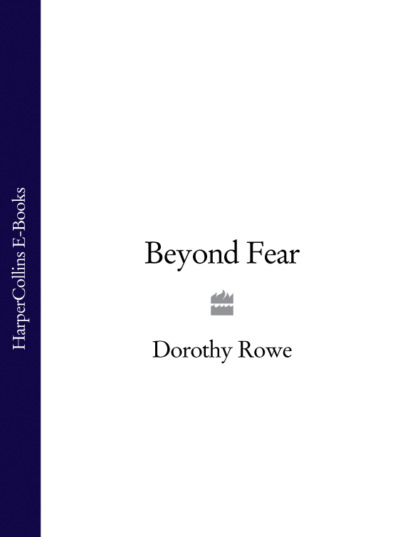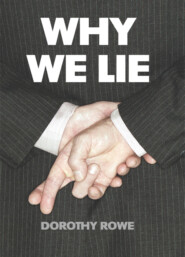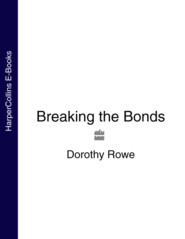По всем вопросам обращайтесь на: info@litportal.ru
(©) 2003-2024.
✖
Beyond Fear
Автор
Год написания книги
2018
Настройки чтения
Размер шрифта
Высота строк
Поля
Whatever defences we choose, these defences have both to ward off those encroachments which threaten annihilation and to contain our fear. To create an effective defence we need to know just what we are defending against. An army commander collects all possible information about his enemy before he decides just how he will defend his position. Similarly, we need to be clear about the nature of the threat to us before we construct a defence. However, sometimes the threat is so frightening that we cannot bring ourselves to acknowledge it. For instance, some people cannot bear to acknowledge that those they are closest to and on whom they depend are a major danger to them. More frequently, the threat that cannot be acknowledged is the fear that they feel. Many of us find fear to be too fearful to acknowledge, and so one of the defences we can choose is to deny that we are afraid.
Chapter Three Fear Denied (#ulink_d3d18761-095f-505a-aa1d-599aad136f02)
We cannot live without denying. We have to shut things out. We have to say to ourselves, ‘No, no, that’s not there. It didn’t happen. I’ll take no notice.’ If we did not do this we would be overwhelmed by the multitude of things going on around us and inside us.
We ignore the noise of the traffic outside our house while we concentrate on watching television. We ignore our sense of tiredness while we push on to finish an important task. We ignore our fear as we rush to save someone else from danger, and when we are commended for our bravery we say, ‘It was nothing. Anyone would have done the same.’
We all know that such denial is necessary in times of stress. By denying painful facts and emotions we become brave. However, such denial is just for a brief period of time. Later we can acknowledge the noise of the traffic, or our tiredness, or, in the privacy of our own home, feel the fear unfelt at the time of danger. Now our experience accords with reality and all is well.
On the other hand, if we do not do this, if we go on and on denying what is happening, then we start to get into difficulties because our experience accords less and less with reality. Denying the aggravating noise of the traffic, we might get angry with our children for being unruly because our denied thought is ‘I bought this house and I’m not going to admit I made a mistake’. Denying awareness of tiredness, we refuse to rest and so become ill, all because our rule for living is ‘It is my responsibility to see that my family are perfectly happy all the time’. Denying awareness of fear, we feel pain and breathlessness, suspect a faulty heart and await imminent death, but we tell ourselves, ‘My father would despise me as a coward if I admitted being afraid.’
Denying Fear as ‘Character’ (#ulink_e9d9ecbc-c67e-5a63-afc9-498be391d036)
Long-term denial puts us further and further out of touch with reality. If we start this kind of denial early enough and practise it assiduously enough we forget that we are denying, and we see the ways in which we deny fear as fixities, part of what we call our personality or character. The long-term denial of fear produces a number of different kinds of ‘character’.
There is the person who is always practical, sensible and down-to-earth. Such people never indulge in fantasy or consider those questions for which there are no practical answers. In my years in the National Health Service I met these characters frequently. There were the administrators who divided the number of patients attending by the number of staff in a psychotherapy unit, decided that the resulting figure was ‘uneconomic’ and closed the unit, all without taking the trouble to find out what actually went on in such places and without balancing the cost of such a place against the cost of each person who, deprived of his attendance at the unit for one or two days a week, became a long-term in-patient. There were the psychiatrists who would assure a frightened, depressed woman that she had a good husband, a nice home, and that she should count her blessings, without once pausing to consider what it must be like to be forced by an unwanted pregnancy and poverty to share a house with a man who beats you up on a Friday night and enjoys his marital rights on a Saturday night, and to know that such a future stretches ahead with death as the only escape. I have tried to explain the subtleties and complexities of such matters to such administrators and psychiatrists, but it is like trying to explain colour to the innately blind.
There is the person who is always busy keeping busy. This is not a successful denial of fear, because the busy person is well aware that stopping being busy means becoming frightened. However, rather than face this fear, the busy person keeps dashing around, doing things, often at the expense of loved ones, who would dearly like to be given a generous share of the busy person’s time or be allowed to order their own lives, and their bedrooms, in their own way, not the busy person’s way. Busy people dash around doing things at the expense too of their own needs and health.
Betty’s husband Roy had come to see me because he could not work. Betty was surprised when I asked whether she would come along to one of our meetings. There was nothing wrong with her, but if it would help Roy she would come. So she did, and talked about herself.
‘I’ve always got to be doing something. I can watch television, if I’m knitting, but I can’t settle to reading, and I just couldn’t sit doing nothing. It annoys me to see people doing nothing. I vacuum and dust right through every day. I’d feel the house isn’t cleaned properly if it isn’t vacuumed one day and dusted the next.’
‘She’s always doing housework,’ said Roy, who, depressed and unemployed, often sat doing nothing.
‘I’ve always worked,’ said Betty. ‘I brought home my first pay packet the week before I turned fourteen. My mother expected us to work. There were six of us. You couldn’t leave one job before you had the next lined up.’
However, she should not be working so hard now. She had angina, and the doctor said she should rest.
‘He says I should rest and put my feet up every afternoon. But I can’t do that. It wouldn’t be right.’
‘Why wouldn’t that be right?’ I asked.
‘I don’t know. I’ve always been like that. I’m that sort of person.’
She said that she was frightened of dying, frightened of having a stroke and ending up like her mother, a helpless invalid. She was no stranger to fear. She knew what it was like to be swept by sudden, drenching fear. ‘I need to be out of the house and with people.’
She spoke of her childhood. ‘I was the third of three daughters and my mother didn’t want me. She told me that. She said when she had me she didn’t look at me for three days.’
So Betty learned early the dread of annihilation, and the way of keeping it at bay by earning her right to exist by working hard. She preferred to risk death by heart failure than face the greater fear of being annihilated by being abandoned and rejected.
Betty worried a good deal, but she dealt with her worries by working. There are many ‘characters’ who deny their fear by worrying. ‘I’m a worrier,’ they say, in the same way as they would say ‘I’m a left-hander’ or ‘I’m a Gemini’, something you are born with, something you cannot change.
Worrying is not good for the health. A churning stomach, tense muscles and an inability to concentrate on the task in hand can produce stomach ulcers, backache and accident injuries, as well as the kind of stress which scientists now see as important in the development of cancer and heart disease. However, worrying does have advantages, and committed worriers are reluctant to give them up.
First, being a worrier allows you to concentrate on small worries rather than a big fear. A worrier can avoid thinking about her fear that her husband is being unfaithful to her by worrying about the state of the carpets in her home; a worrier can avoid thinking about the fear that the economic recession will make his firm bankrupt by worrying about the state of his car. This way of worrying uses a lot of energy, but it does allow you to shut out a great deal of unpleasant reality and saves you from having to bother about the needs of other people.
Second, a worrier usually believes that the sign that you love someone is that you worry about that person. In the worrier’s way of thinking, worrying is a sign of virtue because worrying means that you care, and caring means that you are good. Thus the worrier will often say to loved ones, ‘I worry about you’ and then feel hurt because loved ones do not always react with warmth and affection to such statements. In fact, they often seem offended. They also become very secretive about their activities, so as to spare themselves the guilt of having made the worrier worry. Not that this makes the worrier any happier. Secrecy on the part of loved ones about their activities allows the worrier to expand the range of options about which to worry. Moreover, the worrier usually marries someone who never admits to anxiety, someone who takes pride in being imperturbable, someone who never says ‘I worry about you’. So the worrier has to find more and more to worry about in order to avoid the big fear that ‘Nobody loves me’.
Then the worrier might feel that the third advantage can make up for not being loved. If you feel that the people around you are too selfish and uncaring to love you, or if you suspect that you are unlovable, you can prevent yourself from becoming quite isolated by controlling the people around you and thus keeping them near you. If you cannot make your loved ones love you, you can make them feel guilty by showing them that they have given you cause to worry. Then they, trying to avoid the imposition of guilt, will carry out your wishes. They will come home early, wrap up warmly, not smoke (at least when you are around), drive carefully (with you in the car), not swear, work hard, pass their exams, and so on. A determined worrier can make the injunction ‘Don’t do anything which will cause me to worry’ the basic and absolute moral imperative in a family, and thus become the most powerful person in that family. I recall my father showing me a cartoon from the Saturday Evening Post. It featured a middle-aged couple in bed. The husband is settling down to sleep but the wife is sitting bolt upright and saying, ‘You go to sleep. I’m going to sit here and worry.’ It was the story of his married life.
The fourth advantage extends the worrier’s powers even further, into the realms of magic. There are many worriers who believe that ‘If I worry about something it won’t happen’. Since so many of the things we worry about never eventuate it is impossible to disprove that worrying is an effective way of controlling the universe.
Many worriers, I find, regard their habit of worrying as something they have inherited from a parent, like the colour of their eyes or the shape of their nose. It has not occurred to them that worrying was something they had learned. One thing which parents are always teaching their children is how to become aware of a particular situation, how to define it, how to identify certain elements in it, and how to predict what will follow. Thus one parent will say, ‘You’ve been invited to a birthday party. Won’t that be fun?’ and another parent will say, ‘You’ve been invited to a birthday party. Don’t eat too much or you’ll be ill.’ The ability to identify every potential disastrous element of a situation and to worry about it is a skill which passes from one generation to another, not by a worry gene but by learning.
Regarding the ability to worry as an inherited characteristic is one example of denying fear by keeping things the same. ‘I’m a worrier, my parents are worriers, my grandparents were worriers, my children will be worriers.’ There are many ‘characters’ who devote their efforts to stopping life changing. Since life is change, such efforts achieve little success. Nevertheless, that does not stop ‘characters’ who want to keep everything the same from trying to do this. Such extravert ‘characters’ try to maintain relationships no matter how damaging or empty these relationships may be. As Rachel said, ‘I can’t stand severing a relationship. It wounds me.’ Such introvert ‘characters’ try to prevent their organization and their control of situations changing. They insist that things have to be kept a certain way, that actions have to be performed a certain way. The contents of their rooms must never be changed around, or they must always dress in a particular style, or ceremonies, like the family’s celebration of Christmas, must always be carried out in the same way.
The belief that by repeating our actions we prevent life from changing is as magical as the belief that if you do not talk about a thing it has not happened. This belief often underlies the thinking of those ‘characters’ who take great pride in keeping things to yourself. Such people believe that talking about worries makes them worse, or that admitting fear to yourself and to others shows you to be weak and despicable. This can end in tragedy, as the story of Willie Peacock shows. In 1985 the UK government under Margaret Thatcher wanted to close down most of the mining industry. The miners fought back with a strike in which there was much brutality on the part of the police and, on occasion, on the part of the miners.
The widow of Willie Peacock yesterday accused his fellow miners of hounding him to his death. It was his wife Elizabeth who found him when she got home from work. She opened the front door and saw him hanging from a rafter - unable, she believes, to face one more day’s torment in the pit.
Yesterday, union delegate David Hamilton ordered 1,200 men at Willie’s colliery to stop work for 24 hours as a ‘mark of respect’ but Mrs Peacock is not impressed. ‘As far as I am concerned,’ she said, ‘the NUM can send them back.’
Willie’s friends say that men who stayed out on strike for a year picked on him because he went back after nine months sickened by the murder of a Welsh taxi driver taking a miner to work. His lunch box was contaminated with urine and excrement. His safety was threatened in whispered phone calls that taunted him for ‘being a scab’. His injured foot was stamped on until it was bruised. But Willie never said a word about it to his wife because he did not want to worry her. ‘I knew nothing of what he was going through,’ she said yesterday. ‘That’s the way he was.’
Only since his death, at 41, has she learned of the harassment he suffered. Willie, married 16 years, will be buried today. His last words to his wife were ‘See you later’ and his last present was a model of a miner pushing a coal truck.
(#litres_trial_promo)
We might wonder why Mrs Peacock had not noticed that something was amiss with her husband, but then many women collude with their spouses in pretending that they are strong, imperturbable, silent men. Such a collusion relieves the wife of the responsibility of taking her husband’s feelings into account. Many women believe without question the John Wayne myth that men never get frightened. Thus they can ignore the suffering that some men undergo and collude with the denial of fear which so many men try to achieve.
Denying Other People’s Pain (#ulink_92927bb6-649a-5bf4-8953-49734d11efe9)
Denying other people’s pain is a popular and effective way of denying fear. If someone is in pain, then something fearful has happened. Acknowledging another person’s pain can make us frightened. We fear that the disaster that has happened to the other person could happen to us. Even if we can put this fear from us, assuring ourselves that we are safe, acknowledging another person’s pain arouses in us the sentiment of pity, which is itself a painful emotion. To limit the pain of our pity we rush to help the person in pain - we offer practical help, advice, money - but if there is nothing effective we can do we feel helpless, and this, too, is a painful and fearful state. We pride ourselves on being competent, and any situation which shows that we delude ourselves about our competence is indeed fearful and to be avoided.
Acknowledging another person’s pain can lead us not just to pity but to empathy, that leap of imagination which allows us to immerse ourselves in another person’s experience and to feel their emotions as our own. Thus we can share another person’s joy, but also another person’s pain and fear, and this can be undesirable. Roy, who was ashamed of the way tears would come suddenly and unbidden to his eyes when he was watching television, said, ‘Sometimes I see something, somebody in pain, and I feel their pain, just for a moment.’ Lonely as he was, he adamantly refused to join a self-help group for companionship. He could not bear, so Betty told me, to have to listen to people talking about their troubles.
Empathy is a precious human skill which not only prevents us from being cruel but joins us to others. When we experience empathy we are able, if only momentarily, to leave the loneliness of being and enter another person’s world.
However, to enter another person’s world can mean leaving the haven of safety we have built for ourselves and being forced to recognize that life is capricious, unfair and cruel. We then have to recognize that in pain we are jangled, confused, broken. Grief feels like fear, for in grief we find that the loss we have suffered has revealed that the picture of our life which we had built up was nothing but a fiction, which the loss has shattered. Our security has gone, and we do not know how to reconstruct it. Grief is painful, messy, and the people around us may not wish us to remind them of that.
If people persist in presenting their pain to us, if they will insist on crying, or looking miserable, or parading their grief or their emaciated bodies on our television screens, we can protect ourselves from the fear such sights may arouse in us by saying, ‘They brought it on themselves.’ Blaming the victim is one of the outcomes of the belief in a Just World, where invariably good people are rewarded and bad people punished. If someone is suffering, then this suffering must be the punishment the person deserves. Thus the rape victim should not have provoked her attacker, the beaten child should not have aggravated his parents, the starving tribespeople should have known that the drought would last. We are good and therefore bad things will not happen to us. However, when they do, when we become the victim, we have either to abandon our belief in the Just World and see its ways (and God’s) as capricious or mysterious beyond our comprehension, or else feel very guilty because we were bad, or very resentful because we have been punished unfairly.
Many people, not wishing to feel guilty and wanting to feel self-confident and proud of themselves, refuse to acknowledge another person’s anguish because they fear it will awaken their own anguish and weakness. Rhianon’s husband, a soldier with a distinguished war record, came along with her one day to instruct me to make her better. She was, he said, sick. She had no reason to be miserable and angry, yet there she was moping around the house and sometimes flying into a violent temper. She had even thrown a plate at him. He could not understand her behaviour. When I asked him about his feelings for her he said, ‘Of course I love her. She’s a fine wife.’ When I asked how they organized their domestic routine he said, ‘I help her with the shopping and her housework.’ He had no objection to her interest in music. It was a nice hobby, but, of course, ‘it’s natural for a woman to run a home and bring up children’. Rhianon wept, just as at home she wept in loneliness. He did not move to comfort her, just as at home he would never touch her. He said to me, ‘The sort of chap who puts his arm around his wife when she’s depressed is likely to get dragged down too. He wouldn’t be in charge any more.’
If being loving and caring is seen as weakness or as a way of being contaminated by the other person’s weakness, then another person’s need to be loved must indeed be denied. In the process of learning to be manly, many boys learn to define the loving, caring parts of themselves as feminine, weak and despicable, and so they have to deny that they have such attributes. Such a process of denial prevents them from understanding themselves, and so when in later life they sense within themselves the darkness of depression they are terrified. Rather than face what is inside them, they rush into some kind of frantic activity. They immerse themselves in work or sport, they have affairs with younger women, they take to drink. Anything rather than face their own fear and anguish. Many men in adult life still rely on a technique learned in boyhood, in Phillip Hodson’s words, ‘the happy knack of making themselves feel better by making others feel worse’,
(#litres_trial_promo) a technique which protects them from the pain and fear of observing another person’s pain.
Of course, women too can work at denying their own fear by denying other people’s anguish, even though it is not a defence which society expects a woman to be seen using. Women are supposed to be sensitive and caring, easily and foolishly distressed by another person’s suffering. Many women very effectively reduce the amount of suffering they allow themselves to observe and become frightened about by refusing to read newspapers or to watch the news on television, and by concentrating solely on themselves, their family and their friends. Such deliberate ignorance does not always lead to a happy life. Many women still sense the wider world as being chaotic and dangerous, threatening to destroy what they hold dear.
Women, too, do not find it easy to use the denial of fear which being competitive allows. Our society considers being competitive to be a masculine attribute. Fortunately there are now many women who reject this nonsense - delight in striving, competing and achieving is natural to all of us - and so both men and women can deal with their fear by putting all their energy and conscious thought into winning and defeating. Some competitive people wisely recognize that the fear is there and that striving, competing and achieving are an effective way of confronting and controlling the fear. However, some competitive people do not recognize this. They deny their fear, and then the fear returns in the guise of tension and anger which can disrupt all their relationships, competitive or not.
Just as competitive people are often irritable, so are powerful people, or those with aspirations to power. Becoming powerful is a much-favoured technique for denying one’s fear, be it becoming the dictator of a nation or merely the dictator of a family. Power can be described in different ways, such as having wealth or the ability to punish those who do not obey, but, in terms of denying fear, power can be thought of as the ability to define. The powerful person says, ‘The world is the way I see it and everyone has to agree with me.’ People who do not agree with the powerful person’s definition of reality are fought with, punished and, if defeated, silenced. Powerful people may be effective in controlling their own fear, but they establish and maintain their power by creating fear in others. We each, naturally, define reality in our own individual way, and we give up our definitions only under the threat of rejection, loss, contempt, humiliation or pain. So in the struggle for power, whether in the family or in the state, many of us suffer great fear.
However, becoming powerful does not eradicate the experience of fear. The powerful person has few friends, and so fear returns as loneliness and the fear of abandonment.
Powerful and would-be powerful people are often angry and irritable. Anger is our natural response to frustration, and when we seek to impose our own definitions on the world we often find that the world is recalcitrant and will not always conform to our wishes. Thus the more we try to impose our definitions on the world the more frustration and anger we feel. The discovery that the world does not conform to our expectations can fill us with fear, and, rather than admit that fear, we can turn it into anger. Despots are dangerous because they are frightened and will not admit their fear.









